The Art of Feedback: Giving, Seeking and Receiving Feedback
The Art of Feedback: Giving, Seeking and Receiving Feedback
The Art of Feedback: Giving, Seeking and Receiving Feedback
- No tags were found...
You also want an ePaper? Increase the reach of your titles
YUMPU automatically turns print PDFs into web optimized ePapers that Google loves.
ACTPS Performance Framework<br />
<strong>The</strong> <strong>Art</strong> <strong>of</strong> <strong>Feedback</strong>: <strong>Giving</strong>, <strong>Seeking</strong> <strong>and</strong> <strong>Receiving</strong><br />
<strong>Feedback</strong><br />
What is performance feedback<br />
<strong>Feedback</strong> is a part <strong>of</strong> how we work. It can be a simple comment on a piece <strong>of</strong> work or can be a more detailed <strong>and</strong><br />
structured discussion about how we are going <strong>and</strong> what we could do even better.<br />
It can happen in a ‘day to day’ way, ie:<br />
• You just h<strong>and</strong>led that enquiry really well. You gave the correct information <strong>and</strong> communicated it very clearly.<br />
• I think you could improve the report by talking with X to find out more...<br />
‘Day to day’ feedback happens naturally <strong>and</strong> continuously as part <strong>of</strong> the way we interact with each other at work.<br />
More structured feedback discussions happen when you talk with your supervisor/manager about how you are going<br />
in your job. Structured feedback discussions can happen as part <strong>of</strong> the performance cycle (e.g. performance planning<br />
discussions <strong>and</strong> mid or end <strong>of</strong> cycle review discussions) or at other times if there is a particular matter you wish to<br />
discuss, ie:<br />
• I think the things you do really well are …<br />
• I’ve arranged this time to talk with you about a couple <strong>of</strong> issues I’ve noticed with your work recently…<br />
• Some areas I would like to see you develop in are …<br />
Who can I give feedback to<br />
We can all give feedback to people that we work with in the ACTPS:<br />
• our supervisors/managers<br />
• the staff we supervise/manage (this is a responsibility <strong>of</strong> all supervisors/managers)<br />
• our peers <strong>and</strong> colleagues<br />
• people in other teams/areas that we interact with or rely on to do our job.<br />
It doesn’t matter what level they are, or whether our job is at the same, higher or lower level.<br />
In general we don’t give feedback to members <strong>of</strong> the public or our clients/customers. This may be different in some<br />
roles (e.g. teachers will give feedback to students <strong>and</strong> parents).<br />
Who are the people that need or expect feedback<br />
from you at work Do you provide them with<br />
useful feedback<br />
If you have a concern about providing feedback to anyone at work, it’s a good idea to discuss it with someone whose<br />
pr<strong>of</strong>essional opinion you trust first. Your HR team will be able to <strong>of</strong>fer you advice or further guidance.<br />
See performance in a whole new light www.act.gov.au/performance 1<br />
Ver 1
ACTPS Performance Framework<br />
<strong>The</strong> following image demonstrates the impact <strong>of</strong> getting <strong>and</strong> giving useful feedback:<br />
Getting <strong>and</strong> giving good quality feedback means that we have an accurate idea <strong>of</strong> how we are going at work. We all<br />
need to hear:<br />
• what we did well; <strong>and</strong><br />
• what improvements we can make.<br />
Sometimes we may not recognise comments like these as feedback:<br />
• I noticed that you presented really well in that meeting. You were able to talk confidently but next time - try <strong>and</strong> resolve<br />
any IT issues beforeh<strong>and</strong>.<br />
• I like the way you tried to resolve this issue on your own but next time you come across this problem, please ask X so they<br />
can show you a more effective way to approach it.<br />
• You h<strong>and</strong>led that really well because you really listened to the member <strong>of</strong> the public. In future you can call a colleague<br />
over if you feel you need some more support.<br />
We are all responsible for being alert to feedback when it is given <strong>and</strong> using it to improve the way we work.<br />
• sometimes supervisors/managers may need to make it clear that what is being said is feedback, ie, I’d like to give<br />
you some feedback about your progress on...<br />
Ver 1<br />
2<br />
See performance in a whole new light www.act.gov.au/performance
ACTPS Performance Framework<br />
<strong>Giving</strong> feedback<br />
Five top tips<br />
<strong>The</strong>se tips will work best for more structured feedback sessions but are worth bearing in mind for less planned<br />
conversations too.<br />
1. Choose an appropriate time <strong>and</strong> place.<br />
• Don’t store it up. Give feedback as soon as possible <strong>and</strong> practical (within 24 hours <strong>of</strong> a specific event or<br />
instance if you can).<br />
• Consider your schedules – make sure you <strong>and</strong> the person are both able to prepare for <strong>and</strong> focus on the<br />
discussion<br />
• Have you chosen a meeting place which is overly conspicuous <strong>and</strong> might make the other person feel<br />
‘singled out’ Do you have another option <strong>of</strong> a different time <strong>of</strong> day or another place<br />
• Allow enough time so that you are not rushed.<br />
• Never give “negative” feedback in public.<br />
• On some occasions ‘sleep on it’ if you are angry, upset or stressed because feedback given at the wrong<br />
time <strong>of</strong>ten does more harm than good. <strong>The</strong> feedback should be provided as soon as possible thereafter.<br />
A word <strong>of</strong> caution: Some staff <strong>and</strong> managers choose to have performance discussions outside the workplace<br />
(ie: walking back from a meeting, in a vehicle on the way to another worksite or in a c<strong>of</strong>fee shop). While this<br />
creates a private <strong>and</strong> relaxed discussion it is slightly less formal. If your discussion is potentially difficult, you may<br />
want another setting such as an <strong>of</strong>fice or meeting room.<br />
2. Give feedback in person whenever you can.<br />
• Face-to-face feedback conversations are ‘two-way’ (rather than feedback in an email, through another<br />
person or over the phone). This gives both people more <strong>of</strong> a chance to underst<strong>and</strong> exactly what the<br />
other is saying.<br />
• Be aware <strong>of</strong> your/their body language. Smile when it’s appropriate <strong>and</strong> listen by turning your body<br />
toward the other person <strong>and</strong> nodding to show when you underst<strong>and</strong> their words.<br />
• If you can’t give feedback in person choose your words very carefully to reduce the chance that they are<br />
misunderstood. Maybe ask your manager to check an email before you send it <strong>and</strong> try to fix up a later<br />
time to talk ‘face to face’.<br />
• If you are passing feedback from one person to another (ie: from your manager to a colleague) ensure<br />
that you have enough information to make it meaningful <strong>and</strong> accurate.<br />
See performance in a whole new light www.act.gov.au/performance 3<br />
Ver 1
ACTPS Performance Framework<br />
3. Be prepared<br />
• Ask yourself what you want to achieve from the discussion Do you want to thank the other person or<br />
get them to change in some way<br />
• Plan what you want to talk about <strong>and</strong> what you will say:<br />
»»<br />
be specific <strong>and</strong> use examples (see more information on being specific below)<br />
»»<br />
develop questions to seek the other person’s views <strong>and</strong> ideas <strong>and</strong> encourage a two-way discussion<br />
- e.g. how do you think it went<br />
- what could we have done differently<br />
»»<br />
if you are seeking change or improvement clarify exactly what you want.<br />
NB: when planning your discussion; it might help to write your plan down. You can take it into the<br />
meeting with you <strong>and</strong> use it to help you keep the discussion on track.<br />
• Have an open-mind. You should be prepared for new information to come to your attention as you<br />
discuss your feedback with the other person.<br />
• How does the other person prefer to receive feedback Plan <strong>and</strong> adjust your approach accordingly. For<br />
example:<br />
»»<br />
Find a more private place if you are thanking someone who is uncomfortable receiving lots <strong>of</strong><br />
attention.<br />
»»<br />
Keep your communication very focussed if you know the other person prefers to be direct <strong>and</strong> to<br />
the point.<br />
»»<br />
Ask about their weekend/journey/family before launching straight into the feedback if you know this<br />
will help the other person feel more comfortable.<br />
• If the feedback is about conduct or behaviour the following may help you to get ‘the right words’ clear in<br />
your mind prior to the discussion or ‘pin down’ exactly what want to see changed:<br />
»»<br />
the ACTPS Values <strong>and</strong> Signature Behaviours<br />
»»<br />
Talking about Behaviours: A Guide for Employees <strong>and</strong> Managers<br />
»»<br />
directorate or team specific values or codes <strong>of</strong> conduct<br />
»»<br />
your/their pr<strong>of</strong>essional st<strong>and</strong>ards or codes <strong>of</strong> conduct<br />
»»<br />
seeking advice or guidance from a mentor, trusted adviser or the Employee Assistance Program.<br />
Ver 1<br />
4<br />
See performance in a whole new light www.act.gov.au/performance
ACTPS Performance Framework<br />
4. During a feedback discussion<br />
• First, confirm with the other person that it is a suitable time <strong>and</strong> place.<br />
• Begin the conversation by outlining the background/situation/issue <strong>and</strong> say what you’d like to get from<br />
the discussion.<br />
For example:<br />
“today is your six-month performance review <strong>and</strong> I’d really like to thank you for your contribution to the<br />
team <strong>and</strong> give you some feedback on an area I think you could improve”.<br />
OR<br />
“I’ve asked you to meet with me because <strong>of</strong> the incident that happened yesterday. I’d like you to help me<br />
underst<strong>and</strong> what happened from your point <strong>of</strong> view <strong>and</strong> then I’d like us to talk about how we can stop it<br />
happening again”.<br />
• Encourage a two-way discussion by asking questions <strong>and</strong> listening (the other person should do most <strong>of</strong><br />
the talking) – see below for more information on listening.<br />
• When talking about behaviour; remember to describe the behaviour <strong>and</strong> its impact rather than using<br />
language which labels or ‘targets’ the other person. This will help you keep the discussion from turning<br />
very emotional.<br />
For example, rather than saying:<br />
“You’re being very rude to me”.<br />
Say instead<br />
“When you roll your eyes while I’m speaking; it makes me feel you don’t respect what I’m saying”.<br />
• Remember your plan: Be specific <strong>and</strong> provide examples (see below for tips on being specific).<br />
• Decide together what action you both will take after the meeting.<br />
• Take time out: If the conversation begins to get emotional or you/they need time to ‘digest’ what is being<br />
said - arrange a break <strong>and</strong> reschedule the meeting for a later time.<br />
• Check that the other person has understood what you have said.<br />
• Think about appropriate confidentiality: who has a need to know about the feedback Are you copying<br />
too many people into an email which contains feedback How public are you being about your feedback<br />
conversation<br />
5. Following the discussion<br />
• If the discussion was a scheduled Performance <strong>and</strong> Development session, complete the template to<br />
record what was discussed.<br />
• In other circumstances, if it is appropriate, record your discussion (including any action either <strong>of</strong> you have<br />
committed to) in an email, by letter or as a personal file note <strong>and</strong> provide a copy to the other person.<br />
Appropriate circumstances to do this may include: a challenging discussion/a serious occurrence or<br />
topic/what you discussed was complicated <strong>and</strong> you both need something to remind you in the future.<br />
• Remember that the other person may need a little time to reflect on what was said in your feedback<br />
discussion - they may come to you later with questions or comments.<br />
• Make sure to follow through on any action you have committed to <strong>and</strong> if this isn’t possible, tell the other<br />
person immediately.<br />
See performance in a whole new light www.act.gov.au/performance 5<br />
Ver 1
ACTPS Performance Framework<br />
More about being specific<br />
How helpful would it be to hear the statements below<br />
• You’re doing ok, I’m happy.<br />
• I don’t feel supported by you.<br />
• You need to manage this better.<br />
Being specific involves giving concrete <strong>and</strong> recent examples <strong>of</strong> what expectations they did or didn’t meet. By doing this<br />
you’re giving the other person (or people) a much better chance <strong>of</strong> improving the way they work.<br />
STAR - You can use this model to prepare feedback before actually giving it.<br />
Situation<br />
Describe the situation –<br />
What When Who<br />
Task<br />
What is expected<br />
in relation to work,<br />
behaviours skills or tasks<br />
Action<br />
How did what happened<br />
meet or fall short <strong>of</strong> those<br />
expectations<br />
Result<br />
<strong>The</strong> outcome or impact <strong>of</strong><br />
the action.<br />
“I felt you really supported me when the<br />
project missed the deadline on Friday”.<br />
“I had expected you to be really<br />
frustrated by that because we had<br />
committed to it but….”<br />
“You understood <strong>and</strong> told everyone that<br />
it wasn’t my fault.”<br />
“So I’d like to say thanks, I feel much<br />
better about things.”<br />
“I’ve noticed that you have come in to<br />
work at 9:30 AM three times this week.”<br />
“Your shift starts at 8:00 AM. It’s in our<br />
team agreement that we are all on time<br />
in the morning.”<br />
“Because you came into work later it<br />
meant that someone else had to answer<br />
both your phone <strong>and</strong> theirs <strong>and</strong> open<br />
the mail”.<br />
“It was extremely busy <strong>and</strong> being ‘one<br />
person down’ put a lot <strong>of</strong> unnecessary<br />
pressure on the rest <strong>of</strong> the team”.<br />
Providing balanced feedback<br />
Balanced feedback involves recognising positive things as well as negatives while ensuring that important feedback<br />
messages are understood <strong>and</strong> acted on. Balanced feedback stops people feeling de-motivated by feedback they<br />
may find challenging. It is especially important to provide balanced feedback during Performance <strong>and</strong> Development<br />
reviews <strong>and</strong> assessments because those discussions relate to a stretch <strong>of</strong> time <strong>and</strong> not an isolated issue or incident.<br />
When providing feedback, below is a useful model to consider:<br />
Commend I appreciate the time you spent on ...<br />
In general I am really happy with your performance. I have been impressed with the way<br />
you have ...<br />
Recommend One area where I’d like to see an improvement is ...<br />
Perhaps next time around you could also ...<br />
It’s not yet meeting my expectations. What I’d like to see is ...<br />
One way <strong>of</strong> developing your skills even further would be to ...<br />
Commend<br />
I feel confident that it will go better next time.<br />
I appreciate your willingness to take on board feedback.<br />
Ver 1<br />
6<br />
See performance in a whole new light www.act.gov.au/performance
ACTPS Performance Framework<br />
How to provide ‘difficult’ feedback in a balanced way:<br />
Remember: any positive feedback needs to be genuine. If you are finding it difficult to find something positive to say,<br />
check that your perception has not been influenced by a recent or negative event.<br />
• Be prepared for an emotional reaction, anger, rejection <strong>of</strong> your feedback or maybe tears. Stay calm <strong>and</strong><br />
pr<strong>of</strong>essional. Tell the other person that they can take a break at any time.<br />
• Try <strong>and</strong> talk mainly about options for doing things differently or solutions to the issue.<br />
• Check the other person’s underst<strong>and</strong>ing, summarise <strong>and</strong> confirm agreement <strong>of</strong> the actions you have made <strong>and</strong><br />
make it clear how, <strong>and</strong> when you will follow up.<br />
Try this sequence ………..<br />
When you …<br />
I am concerned because …<br />
Pause for discussion<br />
I would like …<br />
Because …<br />
What do you think<br />
A statement that describes the behaviour without judgment, exaggeration, labelling<br />
or motives. Just state the facts as specifically as possible (You could use the STAR<br />
model outlined above).<br />
Say who or what it impacts <strong>and</strong> what the impact is.<br />
Let the other person respond.<br />
Describe the change to the other person to consider <strong>and</strong> why you think the change<br />
will address the issue/concern.<br />
Listen to the other person’s responses. Be prepared to discuss options.<br />
Managing Up: How to give feedback to your Manager or Supervisor<br />
<strong>Giving</strong> your manager or boss feedback is known as managing up or upwards feedback.<br />
Upwards feedback is an integral part <strong>of</strong> performance discussions.<br />
<strong>The</strong> approach to performance <strong>and</strong> development in the ACTPS is a two-way conversation. This means that employees<br />
<strong>and</strong> their supervisor/manager are encouraged to exchange information, ideas, suggestions <strong>and</strong> feedback.<br />
Upwards feedback should include positive feedback as well as feedback about what you would like to see changed or improved.<br />
Remember that:<br />
• managers need to know what the people they supervise need from them, what they do well <strong>and</strong> where they<br />
could improve<br />
• if you don’t tell them they may not know or underst<strong>and</strong> your expectations <strong>of</strong> them<br />
• managers aren’t perfect <strong>and</strong> require feedback to develop their skills <strong>and</strong> improve – the same as you do.<br />
When can I give upwards feedback<br />
Upwards feedback is no different to any respectful <strong>and</strong> useful feedback - see the advice provided above. Be just as<br />
mindful <strong>of</strong> privacy <strong>and</strong> appropriate ways <strong>of</strong> conducting the feedback session.<br />
See performance in a whole new light www.act.gov.au/performance 7<br />
Ver 1
ACTPS Performance Framework<br />
Tips for upward feedback<br />
At any time: when there is a<br />
burning issue, don’t store it up:<br />
• how you are being supported<br />
to do your job<br />
• what you appreciate about<br />
how you are supervised or<br />
managed<br />
• what you would like your<br />
supervisor/manager to do<br />
differently<br />
• how your supervisor can<br />
continue to support you to<br />
achieve the performance plan<br />
During a performance planning<br />
discussion: know your own likes/<br />
dislikes <strong>and</strong> tell your manager about<br />
them.<br />
• how you prefer work to be<br />
delegated to you<br />
• support you need to achieve<br />
work/life balance<br />
• what sort <strong>of</strong> guidance you<br />
need on particular tasks<br />
• how you prefer to receive<br />
feedback (e.g. how frequently<br />
you would like feedback <strong>and</strong><br />
how you prefer it to be given)<br />
During a review discussion: be<br />
specific<br />
• how you have been supported<br />
to achieve your performance<br />
plan including what has gone<br />
well <strong>and</strong> what could be done<br />
differently or better<br />
• what you appreciate about how<br />
you are supervised or managed<br />
• what you would like your<br />
supervisor/manager to do<br />
differently<br />
• how your supervisor can<br />
continue to support you to<br />
achieve the performance plan<br />
Best practice performance cycle:<br />
<strong>The</strong> process <strong>of</strong> managing up or providing upwards feedback forms part <strong>of</strong> an effective performance cycle. This involves<br />
ongoing discussion, reviewing <strong>and</strong> assessing performance.<br />
Ver 1<br />
8<br />
See performance in a whole new light www.act.gov.au/performance
ACTPS Performance Framework<br />
Some more tips for providing upwards feedback….<br />
• Take a constructive approach to upwards feedback. Be clear on your purpose for providing upwards feedback <strong>and</strong><br />
communicate this purpose. If action isn’t important, <strong>and</strong> you just want you supervisor/manager to listen, let them<br />
know this.<br />
• Present feedback in a positive <strong>and</strong> supporting manner. Don’t just state the problem. Offer options or solutions.<br />
• Make sure your feedback is specific. Use examples to explain your feedback <strong>and</strong> describe what you would<br />
prefer your supervisor/manager to do. General statements such as ‘I don’t feel supported’ or ‘I’m happy with your<br />
supervision’ are not overly helpful.<br />
• If appropriate, thank your supervisor/manager for listening <strong>and</strong> being open to your feedback.<br />
• Acknowledge any changes that have been made in response to your feedback.<br />
• If you think that the discussion may be difficult, refer to Tips for a Difficult Performance Discussion for information<br />
about preparing for, <strong>and</strong> having the discussion.<br />
What if my feedback is not accepted or acted on<br />
• Have the feedback discussion again:<br />
»»<br />
check that they underst<strong>and</strong> your expectations <strong>and</strong> what this means in a practical way – be as specific as you<br />
can<br />
»»<br />
reiterate the impact it is having on you, your capacity to do your work or achievement <strong>of</strong> your performance<br />
plan<br />
»»<br />
ask if there is a reason why your expectations aren’t able to be met.<br />
• Seek advice from a mentor, a trusted advisor, the HR team area in your Directorate or the Employee Assistance<br />
Program<br />
• If you feel you are not getting anywhere with your supervisor/manager <strong>and</strong> the issue is important to you, raise the<br />
issue with a more senior manager.<br />
See performance in a whole new light www.act.gov.au/performance 9<br />
Ver 1
ACTPS Performance Framework<br />
<strong>Seeking</strong> <strong>Feedback</strong><br />
How to ask for feedback<br />
Asking for feedback is one <strong>of</strong> the best ways to feel ‘in control’ <strong>of</strong> your work, get an accurate idea <strong>of</strong> what is expected <strong>of</strong><br />
you <strong>and</strong> judge how you can improve even further.<br />
You can ask for feedback from your manager/supervisor or colleagues at any time:<br />
• Let the other person know you would like feedback so that they have time to prepare.<br />
• You can help the other person prepare by being specific about what you would like feedback on. Prepare a set <strong>of</strong><br />
questions <strong>and</strong> let the other person see them if you have time.<br />
• Ask ‘open questions’. <strong>The</strong>se questions will <strong>of</strong>ten begin with the word ‘Why’ or ‘How’. Open questions are designed to<br />
get full <strong>and</strong> meaningful answers – they can’t be answered with a simple ‘yes’ or ‘no’.<br />
• Some good ‘open’ questions for seeking feedback are:<br />
»»<br />
Why did my work on X hit the right mark for you<br />
»»<br />
How do you think I could h<strong>and</strong>le Mrs Y better<br />
»»<br />
If I was really successful in this job, what would I be doing <strong>and</strong> how would I be doing it<br />
»»<br />
Why do you think I keep having this issue <strong>and</strong> how could I improve things<br />
»»<br />
What is your opinion on the way I h<strong>and</strong>led that question from Mr Z<br />
»»<br />
How would you approach this if you were me<br />
If you are a Supervisor or Manager<br />
Why seek feedback<br />
It can have a number <strong>of</strong> positive benefits for you <strong>and</strong> your team:<br />
• it helps build a feedback culture (where feedback is part <strong>of</strong> the ‘way we do things’)<br />
• it builds relationships that are based on trust<br />
• it builds your own self-awareness about your supervisory skills <strong>and</strong> style.<br />
Ver 1<br />
10<br />
See performance in a whole new light www.act.gov.au/performance
ACTPS Performance Framework<br />
Example questions for seeking feedback<br />
During a performance discussion<br />
• How can I better support you to do your job<br />
• What could I do differently that would help you do<br />
your job<br />
• What am I doing that helps you do your job<br />
• Am I giving you enough feedback<br />
• Am I providing enough guidance <strong>and</strong> information<br />
when delegating work<br />
• Do you feel supported to achieve work-life<br />
balance<br />
• Do you feel you have been given opportunities to<br />
use <strong>and</strong> develop your knowledge <strong>and</strong> skills – how<br />
could we do this better<br />
• Have I supported you enough over the last …<br />
• Am I doing anything that hinders your capacity to<br />
do your job<br />
As part <strong>of</strong> everyday work<br />
• How could I have supported you better on this<br />
task<br />
• Have I given you enough information <strong>and</strong><br />
guidance<br />
• Is there anything more I can/could have done<br />
when you were working on this<br />
• What would you like me to do differently next<br />
time<br />
• Were you happy with the level <strong>of</strong> autonomy/<br />
responsibility you were given<br />
• Could I have provided you with more feedback<br />
along the way<br />
• Have you been able to develop your skills while<br />
doing this work – how could we have better<br />
supported you to develop your skills<br />
By asking questions like these, you’ll let the people that you manage or supervise know that it’s ‘ok’ to give you respectful <strong>and</strong><br />
useful feedback.<br />
See performance in a whole new light www.act.gov.au/performance 11<br />
Ver 1
ACTPS Performance Framework<br />
<strong>Receiving</strong> feedback<br />
When we receive feedback we usually go through three stages – we react, we reflect <strong>and</strong> we respond. For feedback to<br />
be useful it is important that we ‘analyse’ the feedback before responding. <strong>The</strong> following tips provide guidance on how<br />
to approach each <strong>of</strong> these stages:<br />
React<br />
Reflect<br />
Respond<br />
During this stage we:<br />
• Need to be aware <strong>of</strong> <strong>and</strong> manage our emotional reaction to what we are hearing.<br />
Think about how what we say <strong>and</strong> do now will seem to us (<strong>and</strong> others) later on.<br />
• Should concentrate on listening to the feedback <strong>and</strong> ask questions to ensure that<br />
we underst<strong>and</strong> the other person’s views <strong>and</strong> expectations.<br />
• Must remember not to skip the next stage! Depending on what the feedback is,<br />
we might need to end the discussion at this point to give ourselves time to think<br />
properly about what we have heard.<br />
During this stage we:<br />
• Should be honest with ourselves about our own performance <strong>and</strong> be open<br />
minded about what the other person has said.<br />
• Should allow ourselves extra time for our emotions to calm down if necessary.<br />
• Ask for specific examples to help us to underst<strong>and</strong> the feedback e.g.<br />
»»<br />
“What would you have preferred me to do”<br />
»»<br />
“How could I do it differently next time”<br />
During this stage we:<br />
• Accept the feedback by thanking the person giving it.<br />
• If we don’t agree, we respectfully say so <strong>and</strong> support what we’re saying with facts<br />
or our alternative views.<br />
• Should focus on the future <strong>and</strong> improvement - suggest options or solutions. We<br />
respectfully negotiate <strong>and</strong> agree to ‘next steps’ (to address issues raised in the<br />
feedback).<br />
• Need to ensure we underst<strong>and</strong> the next steps <strong>and</strong> we are committed <strong>and</strong> able to<br />
implement what have agreed to do.<br />
Ver 1<br />
12<br />
See performance in a whole new light www.act.gov.au/performance
ACTPS Performance Framework<br />
If you are a Supervisor or Manager<br />
As a supervisor or manager, it is really important that we accept feedback from staff in a positive way. Responding negatively is<br />
likely to damage the working relationship <strong>and</strong> discourage the employee from providing you with feedback in the future.<br />
Here’s how…….<br />
Take responsibility for the feedback<br />
• even if you don’t agree with the feedback take responsibility for the other person’s perception<br />
• “I underst<strong>and</strong> that this has made you angry, thank you for taking the time to tell me.”<br />
Take time to listen to feedback<br />
• if it isn’t an appropriate time apologise <strong>and</strong> schedule a time to discuss the feedback as soon as you can, ie, “I’d really<br />
like to talk with you properly about this so can we meet tomorrow at….”<br />
REACT, REFLECT AND RESPOND (as outlined above)<br />
• some questions which may help you reflect are:<br />
»»<br />
What would you have preferred<br />
»»<br />
What would you like me to have done differently<br />
»»<br />
Can you give me an example <strong>of</strong> how I could have h<strong>and</strong>led that better<br />
• don’t respond straight away if you are upset or angry<br />
»»<br />
“I’d like to take this afternoon to think this through, let’s meet again tomorrow at…..”<br />
Talk about solutions/options<br />
• ask what they would like you to do next time/in future<br />
• suggest solutions<br />
• agree actions<br />
Take action<br />
• do what you said you would do<br />
• if you are unable to take action straight away explain the reasons<br />
Thank the person<br />
• tell them why feedback is important to you<br />
• if appropriate, acknowledge that it may have been difficult for them to give you this feedback<br />
Follow-up<br />
• seek feedback on the impact <strong>of</strong> the changes you have made<br />
How to really listen when giving or receiving feedback<br />
Listening skills have a big impact on feedback discussions. Active listening helps us to:<br />
• underst<strong>and</strong> what the other person is saying <strong>and</strong> their point <strong>of</strong> view<br />
• get to know the other person<br />
• know when the other person has understood what we are saying.<br />
See performance in a whole new light www.act.gov.au/performance 13<br />
Ver 1
ACTPS Performance Framework<br />
<strong>The</strong> following diagram outlines different levels <strong>of</strong> listening:<br />
In feedback discussions we should be using Level 2 (active listening) <strong>and</strong> Level 3 (observational listening).<br />
Level 1: Internal listening<br />
At this level:<br />
• we may be hearing the words the other person is saying but the focus is on listening to our own thoughts<br />
• we may be:<br />
»»<br />
thinking about what we are going to say next<br />
»»<br />
focused on what we think or feel about what the other person is saying<br />
»»<br />
thinking about something else.<br />
Level 2: Attentive listening<br />
At this level:<br />
• we are totally focused on what the person is saying<br />
• we aren’t distracted <strong>and</strong> we are able to give them our full attention<br />
• we use active listening techniques such as paraphrasing or asking questions to confirm underst<strong>and</strong>ing.<br />
This level allows us to listen for facts, meaning <strong>and</strong> intention. This level leads to a common underst<strong>and</strong>ing about what<br />
is being said <strong>and</strong> what the other person wants to achieve.<br />
Level 3: Observational listening<br />
This is a much deeper level <strong>of</strong> listening. At this level we are totally focused on what the person is saying <strong>and</strong>:<br />
• we are attuned to body language, facial expressions <strong>and</strong> tone <strong>of</strong> voice<br />
• we are more likely to identify the other person’s feelings<br />
• we are aware <strong>of</strong> the impact <strong>of</strong> our communication on the other person.<br />
At this level we are able to help the other person underst<strong>and</strong> their own feelings <strong>and</strong> views by reflecting what they are<br />
saying back to them. This is called a reflective listening technique. For example we may say things like:<br />
• ‘I can see you are worried about this because you have said ……….’<br />
• ‘so what I am hearing is that you really like working in the team because you’ve mentioned …… several times’.<br />
Ver 1<br />
14<br />
See performance in a whole new light www.act.gov.au/performance



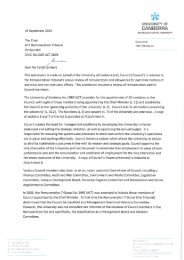

![HSR Training Programs Guidelines [ PDF 191KB]](https://img.yumpu.com/51348280/1/190x245/hsr-training-programs-guidelines-pdf-191kb.jpg?quality=85)


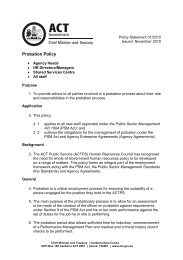
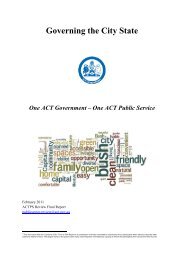
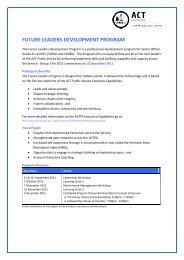

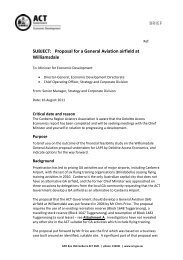
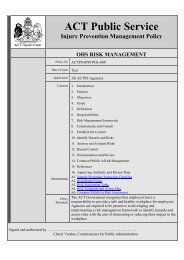
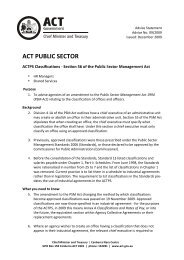
![Teachers Technical and Further Education [ PDF 68KB]](https://img.yumpu.com/34230751/1/184x260/teachers-technical-and-further-education-pdf-68kb.jpg?quality=85)
